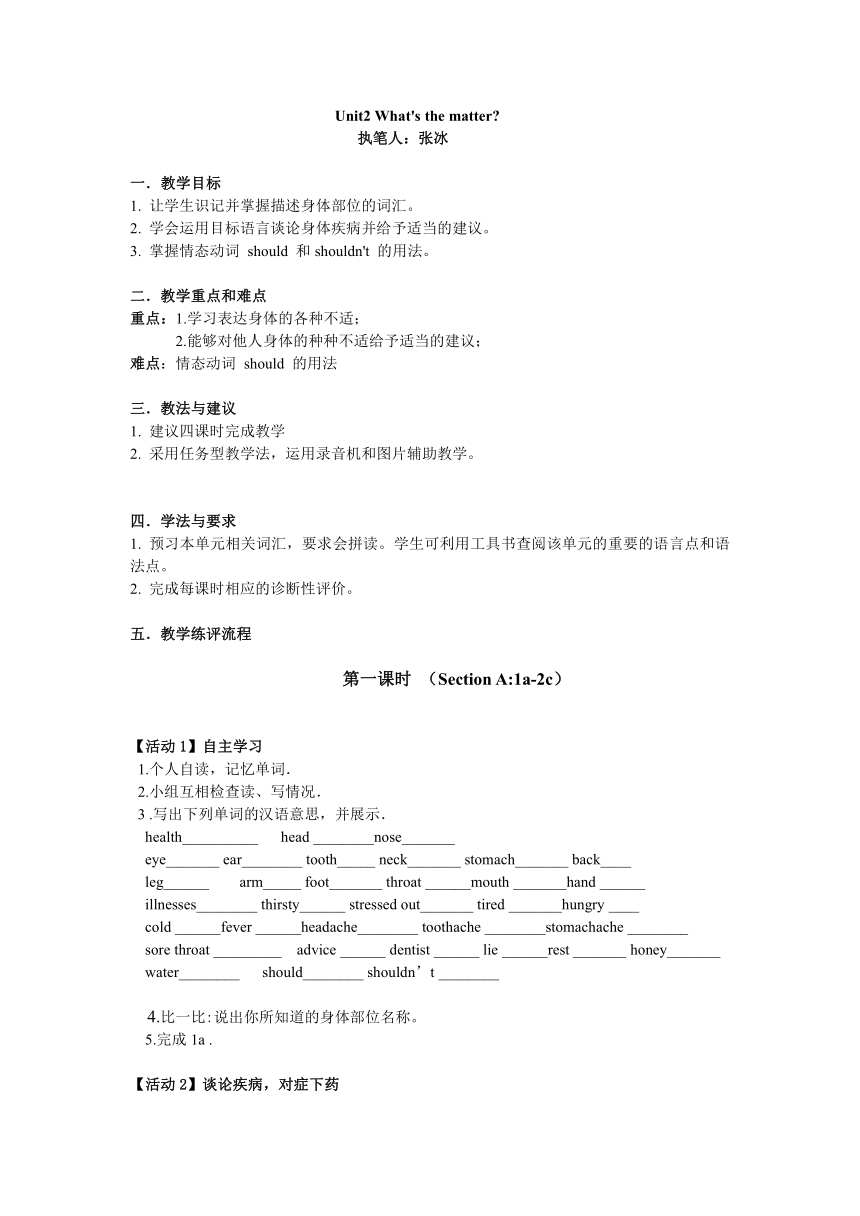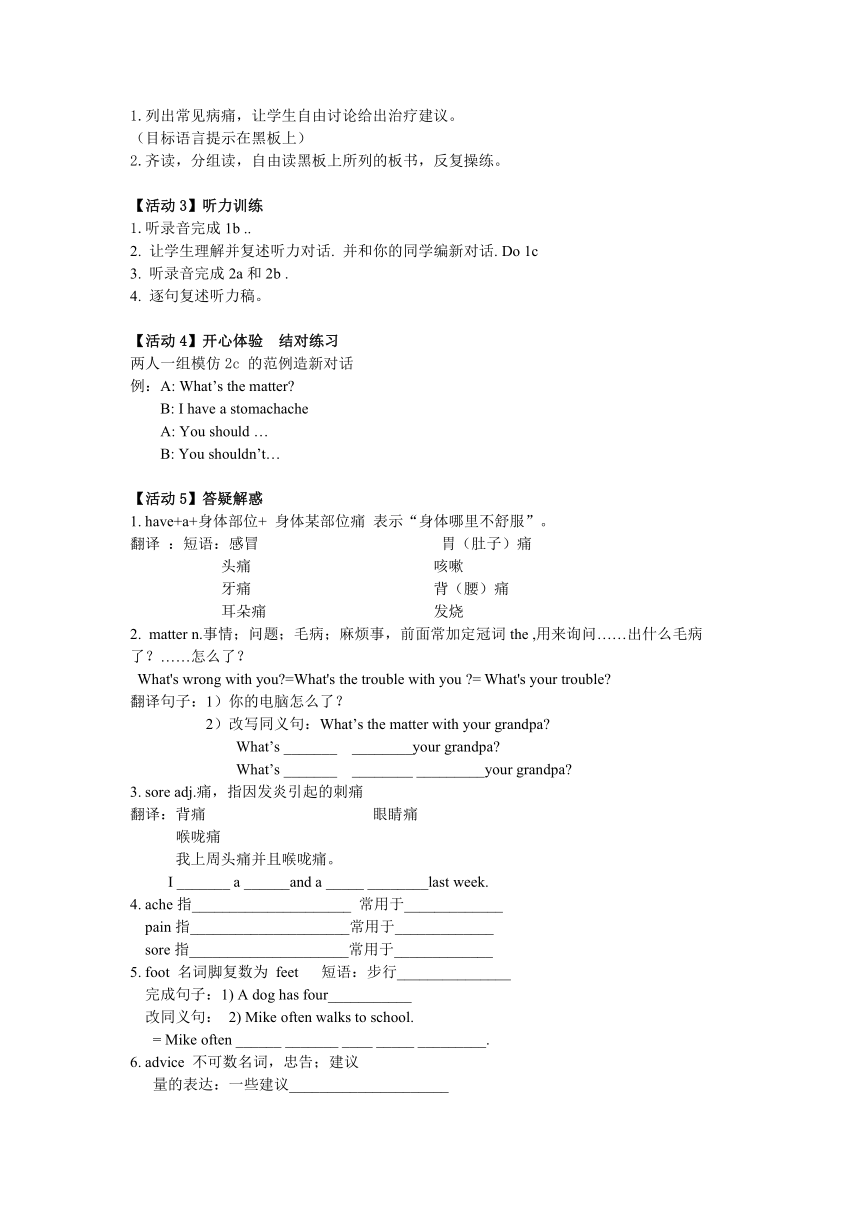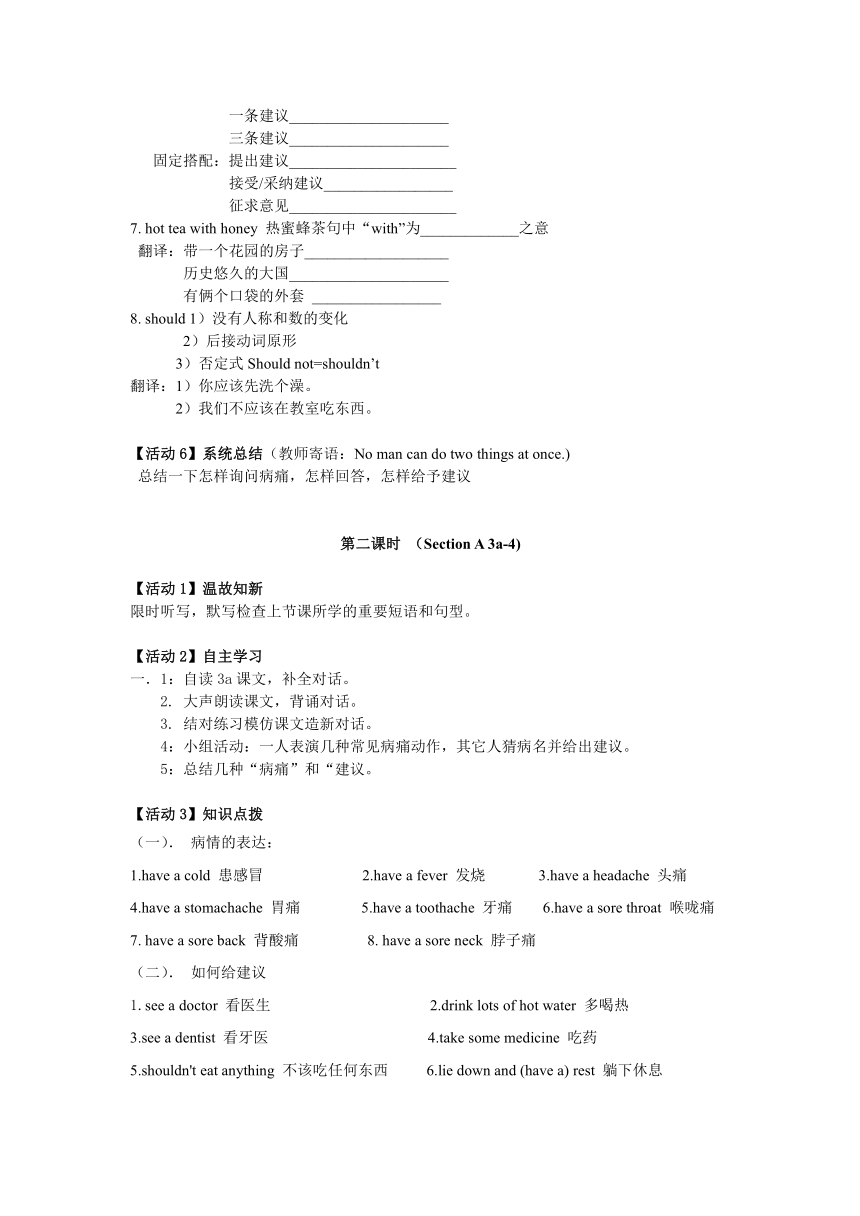Unit 2 What’s the matter?全单元学案
文档属性
| 名称 | Unit 2 What’s the matter?全单元学案 |  | |
| 格式 | zip | ||
| 文件大小 | 15.1KB | ||
| 资源类型 | 教案 | ||
| 版本资源 | 人教新目标(Go for it)版 | ||
| 科目 | 英语 | ||
| 更新时间 | 2013-03-05 22:34:17 | ||
图片预览



文档简介
Unit2 What's the matter?
执笔人:张冰
一.教学目标
1. 让学生识记并掌握描述身体部位的词汇。
2. 学会运用目标语言谈论身体疾病并给予适当的建议。
3. 掌握情态动词 should 和shouldn't 的用法。
教学重点和难点
重点:1.学习表达身体的各种不适;
2.能够对他人身体的种种不适给予适当的建议;
难点:情态动词 should 的用法
教法与建议
建议四课时完成教学
采用任务型教学法,运用录音机和图片辅助教学。
学法与要求
预习本单元相关词汇,要求会拼读。学生可利用工具书查阅该单元的重要的语言点和语法点。
完成每课时相应的诊断性评价。
教学练评流程
第一课时 (Section A:1a-2c)
【活动1】自主学习
1.个人自读,记忆单词.
2.小组互相检查读、写情况.
3 .写出下列单词的汉语意思,并展示.
health__________ head ________nose_______
eye_______ ear________ tooth_____ neck_______ stomach_______ back____
leg______ arm_____ foot_______ throat ______mouth _______hand ______
illnesses________ thirsty______ stressed out_______ tired _______hungry ____
cold ______fever ______headache________ toothache ________stomachache ________
sore throat _________ advice ______ dentist ______ lie ______rest _______ honey_______
water________ should________ shouldn’t ________
4.比一比:说出你所知道的身体部位名称。
5.完成1a .
【活动2】谈论疾病,对症下药
1.列出常见病痛,让学生自由讨论给出治疗建议。
(目标语言提示在黑板上)
齐读,分组读,自由读黑板上所列的板书,反复操练。
【活动3】听力训练
1.听录音完成1b ..
2. 让学生理解并复述听力对话. 并和你的同学编新对话. Do 1c
3. 听录音完成2a和2b .
4. 逐句复述听力稿。
【活动4】开心体验 结对练习
两人一组模仿2c 的范例造新对话
例:A: What’s the matter?
B: I have a stomachache
A: You should …
B: You shouldn’t…
【活动5】答疑解惑
1. have+a+身体部位+ 身体某部位痛 表示“身体哪里不舒服”。
翻译 :短语:感冒 胃(肚子)痛
头痛 咳嗽
牙痛 背(腰)痛
耳朵痛 发烧
matter n.事情;问题;毛病;麻烦事,前面常加定冠词the ,用来询问……出什么毛病了?……怎么了?
What's wrong with you?=What's the trouble with you ?= What's your trouble?
翻译句子:1)你的电脑怎么了?
2)改写同义句:What’s the matter with your grandpa?
What’s _______ ________your grandpa?
What’s _______ ________ _________your grandpa?
3. sore adj.痛,指因发炎引起的刺痛
翻译:背痛 眼睛痛
喉咙痛
我上周头痛并且喉咙痛。
I _______ a ______and a _____ ________last week.
4. ache指_____________________ 常用于_____________
pain指_____________________常用于_____________
sore指_____________________常用于_____________
5. foot 名词脚复数为 feet 短语:步行_______________
完成句子:1) A dog has four___________
改同义句: 2) Mike often walks to school.
= Mike often ______ _______ ____ _____ _________.
6. advice 不可数名词,忠告;建议
量的表达:一些建议_____________________
一条建议_____________________
三条建议_____________________
固定搭配:提出建议______________________
接受/采纳建议_________________
征求意见______________________
7. hot tea with honey 热蜜蜂茶句中“with”为_____________之意
翻译:带一个花园的房子___________________
历史悠久的大国_____________________
有俩个口袋的外套 _________________
8. should 1)没有人称和数的变化
2)后接动词原形
3)否定式Should not=shouldn’t
翻译:1)你应该先洗个澡。
2)我们不应该在教室吃东西。
【活动6】系统总结(教师寄语:No man can do two things at once.)
总结一下怎样询问病痛,怎样回答,怎样给予建议
第二课时 (Section A 3a-4)
【活动1】温故知新
限时听写,默写检查上节课所学的重要短语和句型。
【活动2】自主学习
1:自读3a课文,补全对话。
2. 大声朗读课文,背诵对话。
3. 结对练习模仿课文造新对话。
4:小组活动:一人表演几种常见病痛动作,其它人猜病名并给出建议。
5:总结几种“病痛”和“建议。
【活动3】知识点拨
(一). 病情的表达:
1.have a cold 患感冒 2.have a fever 发烧 3.have a headache 头痛
4.have a stomachache 胃痛 5.have a toothache 牙痛 6.have a sore throat 喉咙痛
7. have a sore back 背酸痛 8. have a sore neck 脖子痛
(二). 如何给建议
1.see a doctor 看医生 2.drink lots of hot water 多喝热
3.see a dentist 看牙医 4.take some medicine 吃药
5.shouldn't eat anything 不该吃任何东西 6.lie down and (have a) rest 躺下休息
7.go to bed early 早点睡觉 8.listen to music 听音乐
9.shouldn't eat any more … 不该再吃……
(三). 看病的表达
1.What's the matter with you?= What's wrong with you= What's the trouble with you = What's your trouble?
"matter" 前须加定冠词the;wrong前不加任何修饰词;trouble 前可加 the,也可加形容词型物主代词
I'm not feeling well. I have a …. 我感觉身体不适, 我得了……。 3. When did it start? 什么时候开始的?
4. It started … ago. ……前开始的。 5. That's too bad. You should / shouldn't …. 那太糟糕了。你应该/不该……。 6. Yes, I think so. / That's a good idea. 是的, 我也这样认为. / 好主意。 7. I hope you feel better soon. 我希望你早点好起来。
【活动4】训练巩固
根据汉语提示,完成句子,每空一词
1.你怎么了?我喉咙痛,一What’s the ___ with you?一I have a ____throat.
2.我喜欢喝热蜂蜜茶,I like ________ hot tea ________ honey.
3.我希望你马上好, I ________ you ________ better soon.
4.那是个好主意, That’s a ________ ________ .
5.你应该躺下休息, You ________ lie down and ________.
【活动5】系统小结
怎样谈论你的健康/提出建议
第三课时(Section B 1a-2c)
【活动1】交流检查
1.交流检查课前预习情况。生生、师生互动互问探讨解决预习中存在的问题。
2.根据汉语写出下列英语单词或短语并展示.
疲倦的__________________ 饥饿的___________ 口渴的____________ 过度紧张的_________________
小组合作完成1a,并核对答案.
【活动2】听力提高
1.听录音完成2a.
2.再听一遍,小组核对答案。
3.根据2c的表格内容,转述听力短文。
【活动3】词义巧辩
区分:tired _______________
stressed out
区分:problem____________________
question____________________
翻译 1)当感到疲倦时,你应该好好休息一下。
2)请仔细听我讲。
3) 我听不清楚。
4) 你能解决这个难题吗?
5) 我可以问一个问题吗?
选择:1)When you feel _____, you can listento some light music.
A. stress out B. stressed out C. to stressed out D. stresses out
2) We have some ________ getting to your house.
A. problem B. question C. problems D. questions
3) Students should answer teachers’ ______more often.
A. problem B. question C. problems D.questions
【活动4】口语训练 2c
1.组内两两合作,根据2a听力内容模仿例子造新对话。
2.展示对话。
【活动5】诊断评价
A、 根据首字母完成句子
1. - How many f_____ does a cat have? -Four.
2. -What’s the matter with you ? - I have a s______ throat.
3. The doctor gives me a lot of a_______.
4. -I ’m s______ out . - You need a rest.
B、单项选择
( )1. What’s the matter ____ you ,Lucy?
Nothing much.
A. on B. with C. to D. of
( )2. I have a bad cold. You should ____________.
A. drink some coffee B. do some exercise
C. go to see a doctor D. stay up late
( )3. He’s tired. He should _____ down.
A. lie B. lay C. lying D. lied
( )4. What’s the matter? I’m not feeling _________.
A. well B. good C. healthy D. health
( )5. You’d better drink some hot tea. That _______ a good idea.
A. sounds B. sounds like C.sound like D. A and B
第四课时 (Section B 3a-Self check)
【活动1】复习检查
复习检查上课时主要内容。引入,操练重点句式、单词、短语.
【活动2】自主学习
1、听3a 课文录音,逐句跟读。
2、快速朗读课文,划出关于情态动词“should”的建议句。
3、仔细自读课文,回答相关问题,做出正误判断。
1).Doctors believe we need a balance of yin and yang. ( )
2). If you are quiet and often tired, maybe you have too much yin.( )
3). If you have too much yang ,you should eat hot yang foods, like beef, Dangshen and Huangqi hurbs. ( )
4). If you are stressed out and angry, maybe you have too much yang. ( )
5). If you have too much yang, you should have some yin foods like tofu . ( )
4.根据文章的理解,完成以下表格。
matter
cause
should
weak and tired
stressed out and tired
5. 补全3b部分的短文。
【活动3】答疑解惑
1.区分“healthy”和 “health”
健康的__________________ 保持健康___________
健康的生活方式____________ 关心我的健康__-_________________
健康状况好___________ 对健康有益_____________
2. "believe"的用法
believe+宾语从句
+宾语+宾语补足语
翻译:1)你相信迈克有健康的生活方式吗?
2)我相信他是诚实的。
3.区分“too much”+
“much too”+
“too many”+
4.“be good for sth” 对-----有好处
“be bad for sth” 对-----有坏处
5.句型:It"s +adj(for sb) + to do sth ‘“it”的形式主语句,“对某人而言,去做某事是....的”。
【活动4】拓展延伸
Writing "3c"
Groupwork part 4.
【活动5】形成性评价
句型转换
1.You should drink something.(否定句)
You drink .
I have a fever..(改为一般疑问句)
_________you_______ a fever ?
3.I believe he is right.(写出同义句)
I ________ ________ he________right.
4. I hope I feel better soon.(写出同义句)
I hope ________ _________ better soon.
5.It started two hours ago.(对划线部分提问)
__________ it ?
II.填入正确的单词。
1.She should _______ (do) her homework first.
2. I think it’s easy __________(have ) a balanced diet.
3. Sometimes the old woman ________(get) tired.
4. My cousin has to stay at home because of his ________(ill).
5. _________( read) in bed is bad for your eyes.
6. Most people in the ______( west) countries like fast food.
7. Many kids enjoy________ (eat) junk food.
8. I have a lot of _______(headache).
9. They exercise every day _______ (stay) healthy.
10. He’s ______(have) an English lesson at the moment.
III翻译汉语。
1. 我背痛。
____________________________________________________
2. 我希望你很快好起来。
____________________________________________________
3. 我觉得我并没有进步。
____________________________________________________
4. 膳食均衡是很重要的。
____________________________________________________
执笔人:张冰
一.教学目标
1. 让学生识记并掌握描述身体部位的词汇。
2. 学会运用目标语言谈论身体疾病并给予适当的建议。
3. 掌握情态动词 should 和shouldn't 的用法。
教学重点和难点
重点:1.学习表达身体的各种不适;
2.能够对他人身体的种种不适给予适当的建议;
难点:情态动词 should 的用法
教法与建议
建议四课时完成教学
采用任务型教学法,运用录音机和图片辅助教学。
学法与要求
预习本单元相关词汇,要求会拼读。学生可利用工具书查阅该单元的重要的语言点和语法点。
完成每课时相应的诊断性评价。
教学练评流程
第一课时 (Section A:1a-2c)
【活动1】自主学习
1.个人自读,记忆单词.
2.小组互相检查读、写情况.
3 .写出下列单词的汉语意思,并展示.
health__________ head ________nose_______
eye_______ ear________ tooth_____ neck_______ stomach_______ back____
leg______ arm_____ foot_______ throat ______mouth _______hand ______
illnesses________ thirsty______ stressed out_______ tired _______hungry ____
cold ______fever ______headache________ toothache ________stomachache ________
sore throat _________ advice ______ dentist ______ lie ______rest _______ honey_______
water________ should________ shouldn’t ________
4.比一比:说出你所知道的身体部位名称。
5.完成1a .
【活动2】谈论疾病,对症下药
1.列出常见病痛,让学生自由讨论给出治疗建议。
(目标语言提示在黑板上)
齐读,分组读,自由读黑板上所列的板书,反复操练。
【活动3】听力训练
1.听录音完成1b ..
2. 让学生理解并复述听力对话. 并和你的同学编新对话. Do 1c
3. 听录音完成2a和2b .
4. 逐句复述听力稿。
【活动4】开心体验 结对练习
两人一组模仿2c 的范例造新对话
例:A: What’s the matter?
B: I have a stomachache
A: You should …
B: You shouldn’t…
【活动5】答疑解惑
1. have+a+身体部位+ 身体某部位痛 表示“身体哪里不舒服”。
翻译 :短语:感冒 胃(肚子)痛
头痛 咳嗽
牙痛 背(腰)痛
耳朵痛 发烧
matter n.事情;问题;毛病;麻烦事,前面常加定冠词the ,用来询问……出什么毛病了?……怎么了?
What's wrong with you?=What's the trouble with you ?= What's your trouble?
翻译句子:1)你的电脑怎么了?
2)改写同义句:What’s the matter with your grandpa?
What’s _______ ________your grandpa?
What’s _______ ________ _________your grandpa?
3. sore adj.痛,指因发炎引起的刺痛
翻译:背痛 眼睛痛
喉咙痛
我上周头痛并且喉咙痛。
I _______ a ______and a _____ ________last week.
4. ache指_____________________ 常用于_____________
pain指_____________________常用于_____________
sore指_____________________常用于_____________
5. foot 名词脚复数为 feet 短语:步行_______________
完成句子:1) A dog has four___________
改同义句: 2) Mike often walks to school.
= Mike often ______ _______ ____ _____ _________.
6. advice 不可数名词,忠告;建议
量的表达:一些建议_____________________
一条建议_____________________
三条建议_____________________
固定搭配:提出建议______________________
接受/采纳建议_________________
征求意见______________________
7. hot tea with honey 热蜜蜂茶句中“with”为_____________之意
翻译:带一个花园的房子___________________
历史悠久的大国_____________________
有俩个口袋的外套 _________________
8. should 1)没有人称和数的变化
2)后接动词原形
3)否定式Should not=shouldn’t
翻译:1)你应该先洗个澡。
2)我们不应该在教室吃东西。
【活动6】系统总结(教师寄语:No man can do two things at once.)
总结一下怎样询问病痛,怎样回答,怎样给予建议
第二课时 (Section A 3a-4)
【活动1】温故知新
限时听写,默写检查上节课所学的重要短语和句型。
【活动2】自主学习
1:自读3a课文,补全对话。
2. 大声朗读课文,背诵对话。
3. 结对练习模仿课文造新对话。
4:小组活动:一人表演几种常见病痛动作,其它人猜病名并给出建议。
5:总结几种“病痛”和“建议。
【活动3】知识点拨
(一). 病情的表达:
1.have a cold 患感冒 2.have a fever 发烧 3.have a headache 头痛
4.have a stomachache 胃痛 5.have a toothache 牙痛 6.have a sore throat 喉咙痛
7. have a sore back 背酸痛 8. have a sore neck 脖子痛
(二). 如何给建议
1.see a doctor 看医生 2.drink lots of hot water 多喝热
3.see a dentist 看牙医 4.take some medicine 吃药
5.shouldn't eat anything 不该吃任何东西 6.lie down and (have a) rest 躺下休息
7.go to bed early 早点睡觉 8.listen to music 听音乐
9.shouldn't eat any more … 不该再吃……
(三). 看病的表达
1.What's the matter with you?= What's wrong with you= What's the trouble with you = What's your trouble?
"matter" 前须加定冠词the;wrong前不加任何修饰词;trouble 前可加 the,也可加形容词型物主代词
I'm not feeling well. I have a …. 我感觉身体不适, 我得了……。 3. When did it start? 什么时候开始的?
4. It started … ago. ……前开始的。 5. That's too bad. You should / shouldn't …. 那太糟糕了。你应该/不该……。 6. Yes, I think so. / That's a good idea. 是的, 我也这样认为. / 好主意。 7. I hope you feel better soon. 我希望你早点好起来。
【活动4】训练巩固
根据汉语提示,完成句子,每空一词
1.你怎么了?我喉咙痛,一What’s the ___ with you?一I have a ____throat.
2.我喜欢喝热蜂蜜茶,I like ________ hot tea ________ honey.
3.我希望你马上好, I ________ you ________ better soon.
4.那是个好主意, That’s a ________ ________ .
5.你应该躺下休息, You ________ lie down and ________.
【活动5】系统小结
怎样谈论你的健康/提出建议
第三课时(Section B 1a-2c)
【活动1】交流检查
1.交流检查课前预习情况。生生、师生互动互问探讨解决预习中存在的问题。
2.根据汉语写出下列英语单词或短语并展示.
疲倦的__________________ 饥饿的___________ 口渴的____________ 过度紧张的_________________
小组合作完成1a,并核对答案.
【活动2】听力提高
1.听录音完成2a.
2.再听一遍,小组核对答案。
3.根据2c的表格内容,转述听力短文。
【活动3】词义巧辩
区分:tired _______________
stressed out
区分:problem____________________
question____________________
翻译 1)当感到疲倦时,你应该好好休息一下。
2)请仔细听我讲。
3) 我听不清楚。
4) 你能解决这个难题吗?
5) 我可以问一个问题吗?
选择:1)When you feel _____, you can listento some light music.
A. stress out B. stressed out C. to stressed out D. stresses out
2) We have some ________ getting to your house.
A. problem B. question C. problems D. questions
3) Students should answer teachers’ ______more often.
A. problem B. question C. problems D.questions
【活动4】口语训练 2c
1.组内两两合作,根据2a听力内容模仿例子造新对话。
2.展示对话。
【活动5】诊断评价
A、 根据首字母完成句子
1. - How many f_____ does a cat have? -Four.
2. -What’s the matter with you ? - I have a s______ throat.
3. The doctor gives me a lot of a_______.
4. -I ’m s______ out . - You need a rest.
B、单项选择
( )1. What’s the matter ____ you ,Lucy?
Nothing much.
A. on B. with C. to D. of
( )2. I have a bad cold. You should ____________.
A. drink some coffee B. do some exercise
C. go to see a doctor D. stay up late
( )3. He’s tired. He should _____ down.
A. lie B. lay C. lying D. lied
( )4. What’s the matter? I’m not feeling _________.
A. well B. good C. healthy D. health
( )5. You’d better drink some hot tea. That _______ a good idea.
A. sounds B. sounds like C.sound like D. A and B
第四课时 (Section B 3a-Self check)
【活动1】复习检查
复习检查上课时主要内容。引入,操练重点句式、单词、短语.
【活动2】自主学习
1、听3a 课文录音,逐句跟读。
2、快速朗读课文,划出关于情态动词“should”的建议句。
3、仔细自读课文,回答相关问题,做出正误判断。
1).Doctors believe we need a balance of yin and yang. ( )
2). If you are quiet and often tired, maybe you have too much yin.( )
3). If you have too much yang ,you should eat hot yang foods, like beef, Dangshen and Huangqi hurbs. ( )
4). If you are stressed out and angry, maybe you have too much yang. ( )
5). If you have too much yang, you should have some yin foods like tofu . ( )
4.根据文章的理解,完成以下表格。
matter
cause
should
weak and tired
stressed out and tired
5. 补全3b部分的短文。
【活动3】答疑解惑
1.区分“healthy”和 “health”
健康的__________________ 保持健康___________
健康的生活方式____________ 关心我的健康__-_________________
健康状况好___________ 对健康有益_____________
2. "believe"的用法
believe+宾语从句
+宾语+宾语补足语
翻译:1)你相信迈克有健康的生活方式吗?
2)我相信他是诚实的。
3.区分“too much”+
“much too”+
“too many”+
4.“be good for sth” 对-----有好处
“be bad for sth” 对-----有坏处
5.句型:It"s +adj(for sb) + to do sth ‘“it”的形式主语句,“对某人而言,去做某事是....的”。
【活动4】拓展延伸
Writing "3c"
Groupwork part 4.
【活动5】形成性评价
句型转换
1.You should drink something.(否定句)
You drink .
I have a fever..(改为一般疑问句)
_________you_______ a fever ?
3.I believe he is right.(写出同义句)
I ________ ________ he________right.
4. I hope I feel better soon.(写出同义句)
I hope ________ _________ better soon.
5.It started two hours ago.(对划线部分提问)
__________ it ?
II.填入正确的单词。
1.She should _______ (do) her homework first.
2. I think it’s easy __________(have ) a balanced diet.
3. Sometimes the old woman ________(get) tired.
4. My cousin has to stay at home because of his ________(ill).
5. _________( read) in bed is bad for your eyes.
6. Most people in the ______( west) countries like fast food.
7. Many kids enjoy________ (eat) junk food.
8. I have a lot of _______(headache).
9. They exercise every day _______ (stay) healthy.
10. He’s ______(have) an English lesson at the moment.
III翻译汉语。
1. 我背痛。
____________________________________________________
2. 我希望你很快好起来。
____________________________________________________
3. 我觉得我并没有进步。
____________________________________________________
4. 膳食均衡是很重要的。
____________________________________________________
同课章节目录
- Unit 1 What's the matter?
- Section A
- Section B
- Unit 2 I'll help to clean up the city parks.
- Section A
- Section B
- Unit 3 Could you please clean your room?
- Section A
- Section B
- Unit 4 Why don't you talk to your parents?
- Section A
- Section B
- Unit 5 What were you doing when the rainstorm came
- Section A
- Section B
- Review of Units 1-5
- Unit 6 An old man tried to move the mountains.
- Section A
- Section B
- Unit 7 What's the highest mountain in the world?
- Section A
- Section B
- Unit 8 Have you read Treasure Island yet?
- Section A
- Section B
- Unit 9 Have you ever been to a museum?
- Section A
- Section B
- Unit 10 I've had this bike for three years.
- Section A
- Section B
